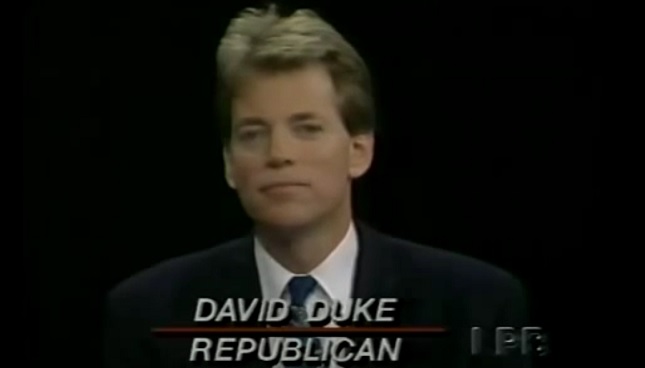
In a 1991 CNN interview, Donald Trump remarked that he hated seeing support for David Duke because it shows there's a lot of “anger” and “hostility in this country” and said President George H.W. Bush “had to come out against him.”
Duke recently urged his white nationalist supporters to vote for Trump. During a February 28 CNN interview, Trump repeatedly refused to denounce Duke's support and claimed, “I don't know anything about David Duke, OK?” Trump later blamed a “lousy earpiece” for his refusal to denounce the former Ku Klux Klan grand wizard, an explanation that is not standing up to scrutiny.
Some of Trump's media supporters have dismissed the Duke issue as “gotcha politics” and bizarrely called Duke a “hardcore leftist.” Trump ally and conservative author Roger Stone suggested on Alex Jones' program that Trump “doesn't know who David Duke is.” Stone continued that “he doesn't know this guy ran for governor and did well. He doesn't know that he's a hater and a bigot. You know, this is an attempt to smear Trump.”
Duke ran for Louisiana governor as a Republican in 1991. On November 6, 1991, President Bush issued “his strongest comments to date” against Duke and condemned him as someone who doesn't deserve “one iota of public trust. When someone has so recently endorsed Nazism, it is inconceivable that someone can reasonably aspire to a leadership role in a free society.” Duke was defeated on November 17, 1991, and then mounted an unsuccessful presidential bid.
In an interview on Larry King Live on November 19, 1991, Trump acknowledged Duke's support as representing “anger” and “hostility.” When King said that President “Bush morally had to come out against him,” Trump agreed that “Bush had to come out against him.” Here is a transcript of that show, via Nexis:
KING: Did the David Duke thing bother you? Fifty-five percent of the whites in Louisiana voted for him.
Mr. TRUMP: I hate-
KING: Four hundred New Yorkers contributed.
Mr. TRUMP: I hate seeing what it represents, but I guess it just shows there's a lot of hostility in this country. There's a tremendous amount of hostility in the United States.
KING: Anger?
Mr. TRUMP: It's anger. I mean, that's an anger vote. People are angry about what's happened. People are angry about the jobs. If you look at Louisiana, they're really in deep trouble. When you talk about the East Coast - It's not the East Coast. It's the East Coast, the middle coast, the West Coast-
KING: If he runs and Pat Buchanan runs, might you see a really divided vote?
Mr. TRUMP: Well, I think if they run, or even if David Duke- I mean, George Bush was very, very strong against David Duke. I think if he had it to do again, he might not have gotten involved in that campaign because I think David Duke now, if he runs, takes away almost exclusively Bush votes and then a guy like Cuomo runs- I think Cuomo can win the election.
KING: But Bush morally had to come out against him.
Mr. TRUMP: I think Bush had to come out against him. I think Bush- If David Duke runs, David Duke is going to get a lot of votes. Whether that be good or bad, David Duke is going to get a lot of votes. Pat Buchanan - who really has many of the same theories, except it's in a better package - Pat Buchanan is going to take a lot of votes away from George Bush. So if you have these two guys running, or even one of them running, I think George Bush could be in big trouble.
Others have noted that prior to his 2016 run, Trump didn't play dumb about knowing Duke. He wrote in 2000: “Although I am totally comfortable with the people in the New York Independence Party, I leave the Reform Party to David Duke, Pat Buchanan and Lenora Fulani. That is not company I wish to keep.”
Numerous white nationalist figures have been supporting Trump's campaign. His candidacy has also been a fundraising engine for white nationalist media websites, which have praised Trump for spurring “unprecedented interest in” their ideology and putting their ideas “firmly in the mainstream.”